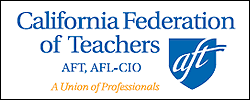
Spring Semester 2018 at the Outset
CCFT has held several meetings in the opening weeks of the semester. It is a season of transition for our local and for Cabrillo College. For flex week we welcomed our new executive director, Daniel Dodge, the former mayor of Watsonville. Daniel brings with him a background in labor organizing as well as state and local politics. Later, at our first council meeting of the semester, we welcomed new Cabrillo College President Matt Wetstein. Dr. Wetstein offered a friendly greeting to CCFT and explained his own background as an academic and former unionist. He also took questions from council for several minutes.
This year will be a challenging one, as CCFT faces the loss of agency fee with the Janus Supreme Court decision coming this spring. But CCFT and AFT locals across the nation know that we can organize and sustain our union by fighting for real gains for our students, our communities, and our members. We will need the determination of the striking teachers in West Virginia; we will also need the creativity of more of our CCFT members. Locally we can connect and link up with other unions and strengthen our presence on the Monterey Bay Central Labor Council.
College for All Initiative in the Signature Gathering Stages
Signature gathering is under way for an initiative that would make public higher education tuition-free. College For All would raise an estate tax on families with $7 million estates and individuals with $3.5 million estates. Such a tax would generate about $4 billion in revenue annually. That money would then provide “last dollar” funding to all students not currently receiving some form of tuition waiver, scholarship, or grant. The initiative expands access to Cal Grants for as many as 330,000 students; it also includes provisions for formerly-incarcerated students, as well as undocumented students. It is inclusive and universal; while everyone is funded, working class students see an 80% increase in cost of living aid, which is money for food, housing, and books. CFT has already endorsed the measure and our local will consider endorsement at an upcoming council meeting.
Pajaro Valley Federation of Teachers in Mediation with PVUSD
PVFT President Francisco Rodriguez spoke at our recent council meeting about the current contract negotiations impasse in Pajaro. The union is currently in mediation with the district. The main sticking points in negotiations are over low pay, especially for first year teachers, and an attempt by the district to cap benefits spending and disband the benefits committee. President Rodriguez appeared before us to ask us to pass a resolution in support of the PVFT in its struggle. The district has and $57 million and is certainly not hurting. Yet PVUSD struggles to recruit teachers from the surrounding credential programs because average pay is so much higher elsewhere in nearby districts. The district’s attempt to cap benefits must also be closely watched. The case arguably a testing ground for top-down decisions of this sort; if benefits can be capped in PVUSD, they can be capped elsewhere, too. Realizing their struggle is our struggle, council passed the resolution in support of PVFT in its contract negotiations.
Online-only Community College Opposed by CFT and Faculty
By now, many CCFT members are aware of the online-only community college being proposed by Governor Brown and endorsed by California Community College Chancellor Eloy Ortiz Oakley. There has been strong opposition to the proposal on campus at Cabrillo, with our Faculty Senate weighing in against it last semester. Governor Brown is requesting more than one hundred million dollars for the project; this comes at a time when many colleges in our system are offering online courses already. The Chancellor’s office even has an Online Education Initiative, which has spent $57 million to develop the excellent online educational offerings at Cabrillo College and elsewhere. Legislative hearings are coming up and CFT continues to advocate before the legislature; some representatives do seem skeptical of the proposal. The online-only college is the latest attempt by Governor to push for online courses in public higher education; he met resistance at UC, and a pilot at San Jose State was cancelled.
Janus Argued Before the Supreme Court
As readers of this newsletter know, we’ve been following the Janus v. AFSCME case for some time; the case would make every state in the country a right-to-work state. On February 26, 2018, arguments were finally heard before the Supreme Court. There was an hour or so of debate before the justices. There were some interesting theatrics. David Frederick argued for the union and he is a former partner of new Justice Neil Gorsuch. Frederick seemed to address Gorsuch throughout the hearing, but Gorsuch himself remained silent during oral arguments. The liberal wing of the court presented arguments about the disruption that the overturning of Abood would bring into labor and employer relations in the public sector, but for the most part the conservative wing of the court seemed uninterested in this form of argument. If Gorsuch votes with the conservatives, which seems assured, then the era of agency fee will soon be over.
Lecturers on Strike in UK and Teachers on Strike in West Virginia
Lecturers went on a fourteen-day strike at the end of February in the British University system. They are striking because of the wholesale privatization of their pension system. At the heart of the struggle is the Universities Superannuation Scheme, which is supposed to be in financial peril, an argument that the lecturers find dubious. In the new scheme, employees would likely lose some $10,000 in annual retirement income. The strike is one of the biggest labor actions to take place since the May government passed new legislation to make industrial actions more difficult. Meanwhile in West Virginia, public school teachers are out on strike. In West Virginia, the strike is remarkable because the teachers have no right to a strike in a right-to-work state, but they took action anyway. They even remained on strike after a supposed deal had been reached to raise salaries; it wasn’t enough for teachers who also face soaring healthcare costs. Starting salaries for teachers are just $32,000 per year in West Virginia and long-time veteran teachers have salaries that lag far behind their counterparts in other states. As of this writing, the West Virginia Teachers remain on strike as we head into the first week of March.



